What’s up with Chávez?
The normally loquacious Chávez has been almost silent since emergency surgery in Cuba on June 10th.
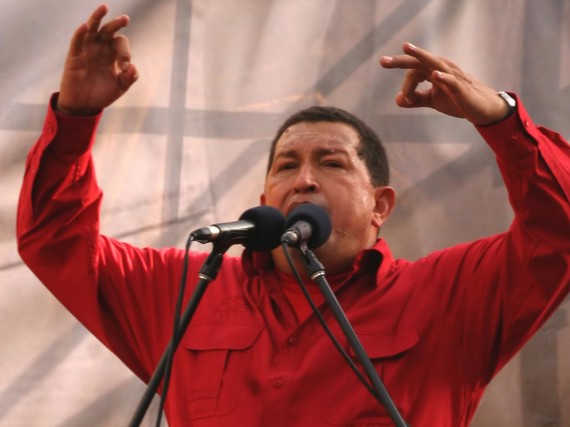 Via the BBC: Absence of ill Hugo Chavez sparks speculation:
Via the BBC: Absence of ill Hugo Chavez sparks speculation:
There is growing uncertainty in Venezuela over President Hugo Chavez’s health, two weeks after he underwent an operation in Cuba for what the authorities said was a pelvic abscess.
On Friday the Venezuelan Foreign Minister Nicolas Maduro said Mr Chavez – who is still in Cuba – was in what he called a “great battle” for his health.
But Vice-President Elias Jaua accused the media of stoking speculation.
“We will have Chavez for a long time!”, he said on Saturday.
The normally loquacious Mr Chavez, 56, had been uncharacteristically quiet since apparently undergoing surgery on 10 June in Cuba. He had been visiting the island as part of an international tour.
He had fallen silent after making a telephone call to state media on 12 June to tell them he was recovering quickly, and that medical tests showed no sign of a “malignant” illness.
First, “pelvic abscess”sounds like no fun at all.
Second, the whole thing is quite curious.
More from WaPo:
The government has treated the president’s departure since June 10 as a state secret, providing scant details about his condition. What Chavez’s closest associates have publicly said has only fueled speculation about the health of the man who has so dominated politics in his 12 years in power that no one successor has ever emerged, even from within his populist Bolivarian movement.
[…]
The departure of Chavez for so long, particularly from the airwaves that he commandeers frequently in Venezuela, has prompted a heated debate over who would, or should, be in charge of the country. In a government that political analysts say is filled with yes-men who rarely question his decisions, Chavez’s illness has exposed the lack of any reliable leader to replace him.
“He has been centralizing power during 12 years now, putting himself in the foreground as the only and indispensable leader,” Demetrio Boersner, a historian and former Venezuelan diplomat, said by phone from Caracas. “So right now, there is no personality within the governing party that seems like the logical substitute in case it would be necessary to replace him.”
The government’s official account is that Chavez began suffering from abdominal pain during a meeting with Fidel Castro in Havana and was rushed to surgery.
There is little doubt that if Chávez were to that it would cause a serious political crisis in Venezuela. For one thing, it is undeniably the case that he has been the political figure of significance in Venezuela since the collapse of the old party system in the the 1990s—the very collapse that allowed him to win the presidency in the first place. Further, his dominance of politics has been so complete that he has no peers of significance within his own party nor has a significant opposition of any type emerged.
There is also the lack of clear guidance in the constitution as to what to do in a case like this. According to WaPo:
The Venezuelan constitution says the vice president would take the president’s place during a “temporary” absence. But Vice President Elias Jaua rejected the demands of some government foes that he be sworn in on an interim basis.
The difficulty is whether this current situation qualifies as a “temporary absence” and, more importantly, who would get to make such a determination. The constitution does provide for permanent vacancies (either a new election or the veep taking over, depending on when in the president’s term the vacancy occurs).
The entire situation underscores the ultimate fragility of politics based on personality:
Luis Vicente Leon, who heads the Datanalisis polling firm and has been a close observer of the government, said that no one with Chavez’s charisma or ability to unite a broad political base has ever emerged.
“I don’t think Chavez has thought that something like this would ever happen,” Leon said by phone from Caracas. “Chavez has overshadowed everyone in his movement. And he has not permitted that other independent-minded leaders rise up.”
Of course, should Chávez recover, the issue will be moot, as he will stand for re-election next year and win.
And I conclude with the line of the day:
“You cannot run a country via Twitter,” said Antonio Ledezma, the mayor of Caracas and one of Chavez’s most determined political foes.
Indeed.
Chávez is big Tweeter and the fact that his Twitter account went silent was one of many reasons that the public knew something was up. He (or someone in his name) has starting tweeting again, however.
Update: See also, Fox News: Report: Hugo Chávez in Critical Condition In Cuban Hospital.

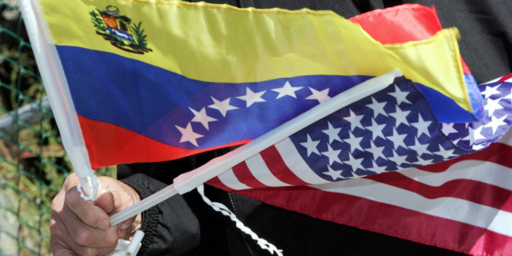
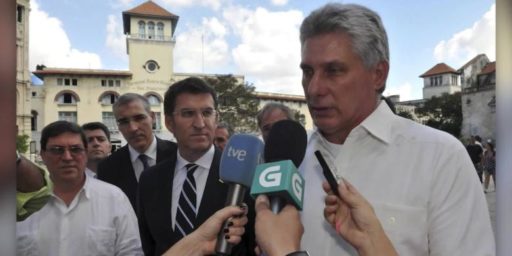
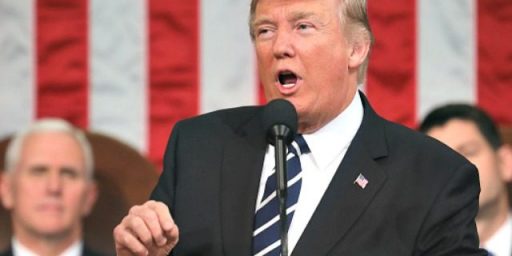
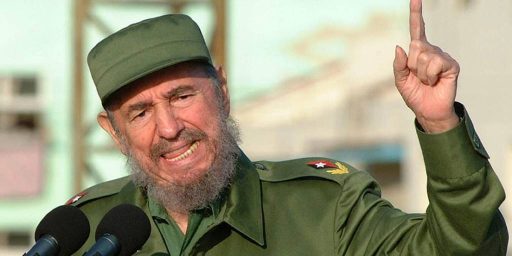
Three cheers for socialized medicine! Someone put Michael Moore on suicide watch!
(And by that, I mean “put a camera on him to record every moment for prosperity,” not “keep him from killing himself.”)
J.
@Jay:
I am not sure we can infer anything at all from this story in regards to the quality of health care in Cuba. I say this not to defend Cuban health care, but just to note that there is zero information in this story to go along with your statement.
All true, Steven, but please… indulge me a little. It’s Hugo Chavez who’s apparently in big medical trouble in Castro’s Cuba, lauded as “superior to the US system” by Michael Moore. It’s a trifecta of win. Can’t I do just a little celebrating?
I think I still have the streamers from Yassir Arafat’s final days in Paris tucked away somewhere…
J.
J : So you’re saying that if he was here in the USA CHavez would already be fixed and ruling with an iron grip again? What are your basis for this theory? When did you treat Mr Chavez?
matt:
Lighten up, Francis.
What I’m saying is, I like it when bad things happen to bad people. And when it involves multiple bad people, I like it even better. Here, a brutal anti-American dictator is in grave health while being treated by a health system overseen by another brutal anti-American dictator, and whose health care system has been praised by a particularly stupid anti-American pain in the ass.
It’s a cornucopia of win. In this particular case, I really don’t care about the specifics; it is utterly irrelevant to my glee whether or not Chavez would have a better chance of recovering had he come to the US — which is something I doubt he would ever do, anyway.
Can’t you just enjoy it with me? It’s a good day for America. I haven’t felt this kind of feeling since Yassir Arafat was in that Paris hospital. In that case, it only involved Arafat and bashing the French, but Arafat was so much worse, it made up for the lameness of the French and there only being two parties’ misfortune to enjoy.
Who micturated in your cornflakes, matt?
J.
I will not label Micheal Moore anti-American (I should would label him a lot of other things though) nor I will not join you in enjoying the pain and suffering of a fellow human (at least in this case). That is all..
I will join you in LULing at my post though.. I shouldn’t be so quick to hit the post comment after being up for a couple days.
matt, I’m not always a nice person. I accept that, and occasionally embrace it. In the case of Chavez and Castro, I revel in it. In Moore’s case, I’ll agree he’s less heinous than the other two), but I still put him in the “loathsome” category. And he’s certainly made common cause with enough of our enemies — Castro, Chavez, the Iraqi insurgents and terrorists (he likened them to our founding fathers), and so on.
Still… this discussion has gotten far, far more serious than it merits.
J.
How is he like the Iraqi insurgents?
Don’t you realize that our founding fathers were considered terrorists? What you think jolly ol England had no problem with the Americans shooting the red coats and fellow Americans who were still loyal to the crown (Tories)?
One man’s terrorist is another mans freedom fighter…
matt, “likened” means “compared to.” And I don’t recall the founding fathers slaughtering civilians and murdering innocents by attacking markets and other civilian gathering places.
“One man’s terrorist is another man’s freedom fighter.’ That’ just another way of saying “I’d rather not cast judgment on murderers and vile scum. It makes me feel icky.” No, thanks.
J.
Innocent casualties are parts of all wars including our independence (which there were innocents caught up in the gunfire). The British would certainly of considered the Tories killed and injured to be innocents and I’m certain they would of called themselves innocents.
Compare
1 : to represent as similar : liken
Care to elaborate?
Due to the fact that I lost a brother in Iraq I about had a huge rage fit in response to this complete idiocy of yours. Fortunately I as able to compose myself before responding.
It’s another way of saying that ‘Things aren’t always what they seem”. I know I’d be a murderer and vile scum in your eyes if you came over here and did half the shit we’re doing in Iraq.. Don’t get me wrong I’d kill the dude who built the IED that killed my brother without even blinking but at least he was targeting a military target and my response would be in the same vein..
matt, my condolences for your loss. I certainly didn’t intend to cause you any discomfort.
But back to our discussion: yes, innocents die in any conflict. But I apply a moral scale to such deaths.
1) Those killed despite efforts to avoid such deaths.
2) Those killed in utter disregard for their safety.
3) Those killed as deliberate acts.
I put our military in Category 1. During World War II, there was a lot of Category 2. In Category 3, I put things like the My Lai Massacre and the average Iraqi “insurgent” attack.
When our side does it, it’s a crime and we treat it as such.
When their side does it, it’s celebrated as a great victory.
I consider our side infinitely superior, morally.
J.
Thanks it appears we agree.
I just wish we always treated it as a crime 🙁
matt, we do, far more often than we don’t. And even when we don’t, the fact that we (for a very, very broad definition of “we”) cover it up at least means we recognize that it’s something wrong, something to be ashamed of.
No, we’re not perfect. Yes, we can stand to do better. But we are far, far, far superior morally to the other side.
J.
Amen